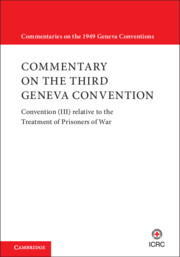 Commentary on the Third Geneva Convention
Commentary on the Third Geneva Convention from Section IV - Financial resources of prisoners of war
Published online by Cambridge University Press: 21 August 2021
The amounts due by the Detaining Power to prisoners of war on their releaseor repatriation are not paid to them in cash. Instead, the prisoners mustreceive a statement signed by an authorized officer showing all amounts dueto them. Article 66 thus equips prisoners with the evidence necessary forany claims they may file with the Power on which they depend. The DetainingPower is also obliged to send, through the Protecting Power, if there isone, to the Power on which the prisoners depend a comprehensive list showingthe credit balances of all prisoners’ accounts. The third paragraph obligesthe Power on which the prisoners depend to settle with the prisoners (i.e.pay) the amounts the Detaining Power owes them.
To save this book to your Kindle, first ensure [email protected] is added to your Approved Personal Document E-mail List under your Personal Document Settings on the Manage Your Content and Devices page of your Amazon account. Then enter the ‘name’ part of your Kindle email address below. Find out more about saving to your Kindle.
Note you can select to save to either the @free.kindle.com or @kindle.com variations. ‘@free.kindle.com’ emails are free but can only be saved to your device when it is connected to wi-fi. ‘@kindle.com’ emails can be delivered even when you are not connected to wi-fi, but note that service fees apply.
Find out more about the Kindle Personal Document Service.
To save content items to your account, please confirm that you agree to abide by our usage policies. If this is the first time you use this feature, you will be asked to authorise Cambridge Core to connect with your account. Find out more about saving content to Dropbox.
To save content items to your account, please confirm that you agree to abide by our usage policies. If this is the first time you use this feature, you will be asked to authorise Cambridge Core to connect with your account. Find out more about saving content to Google Drive.